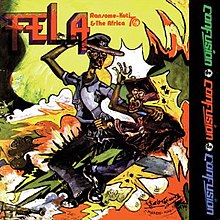Confusion (album)
| Confusion | ||||
|---|---|---|---|---|
 |
||||
| Studio album by Fela Ransome-Kuti and the Africa 70 | ||||
| Released | 1975 | |||
| Recorded | 1974 | |||
| Genre | Afrobeat | |||
| Length | 25:36 | |||
| Label | EMI | |||
| Producer | Fela Ransome-Kuti | |||
| Fela Kuti chronology | ||||
|
||||
Confusion is a studio album by Nigerian Afrobeat musician Fela Kuti and his band the Africa 70. It was arranged, composed, and produced by Kuti, and released in 1975 by EMI. He recorded the album after choosing to emphasize his African heritage and nationalism in his music. Confusion is a commentary on the confused state of post-colonial Lagos and its lack of infrastructure and proper leadership at the time. Kuti's pidgin English lyrics depict difficult conditions in the city, including a frenetic, multilingual trading market and inextricable traffic jams in Lagos' major intersections.
Confusion is a one-song Afrobeat album that begins with an entirely instrumental first half, which features free form interplay between Kuti's electric piano and drummer Tony Allen. It leads to an extended mid-tempo section with Allen's polyrhythms and tenor saxophone by Kuti, who subsequently delivers call-and-response vocal passages. In retrospective reviews, the album was praised by music critics, who found it exemplary of Kuti's Afrobeat style and recommended it as a highlight from his extensive catalog. In both 2000 and 2010, Confusion was reissued and bundled with Kuti's 1973 album Gentleman.
After becoming dissatisfied with studying European composers at the Trinity College of Music, Fela Kuti formed his first band Koola Lobitos in 1961 and quickly became a popular act in the London club scene. He returned to his native Nigeria in 1963 and formed another band that played a rhythmic fusion of traditional highlife music and jazz. Kuti dubbed his hybrid style "Afrobeat", which served in part as his critique of African performers who he felt had forsaken their native musical roots for American popular music trends. In 1969, he toured with his band in Los Angeles and was introduced by a friend to the writings of Black nationalist and Afrocentrist proponents such as Malcolm X and Eldridge Cleaver. Inspired by what he had read, Kuti decided to write more political and critical music, and changed the name of his band to the Nigeria 70 and later the Africa 70.
...
Wikipedia
